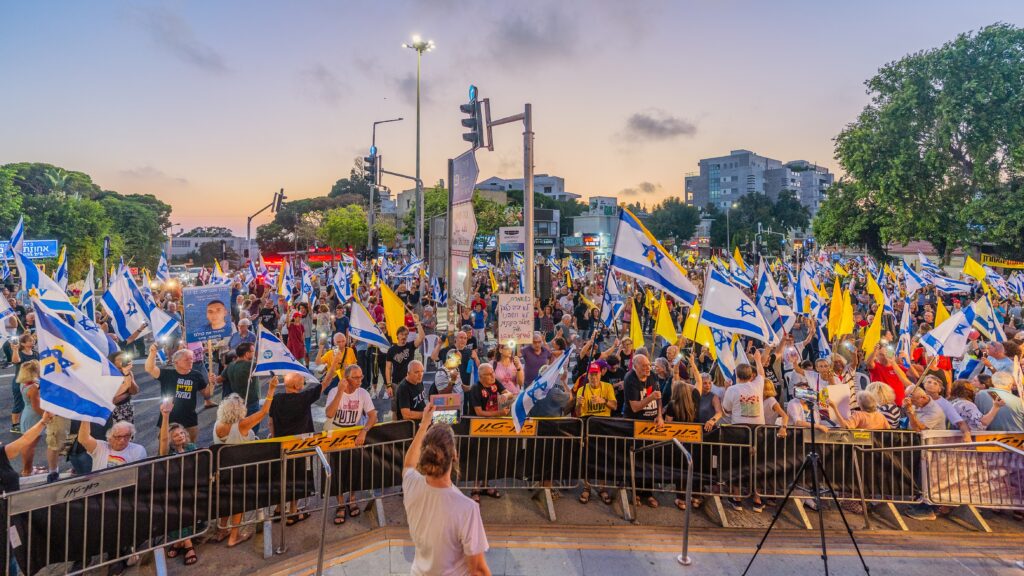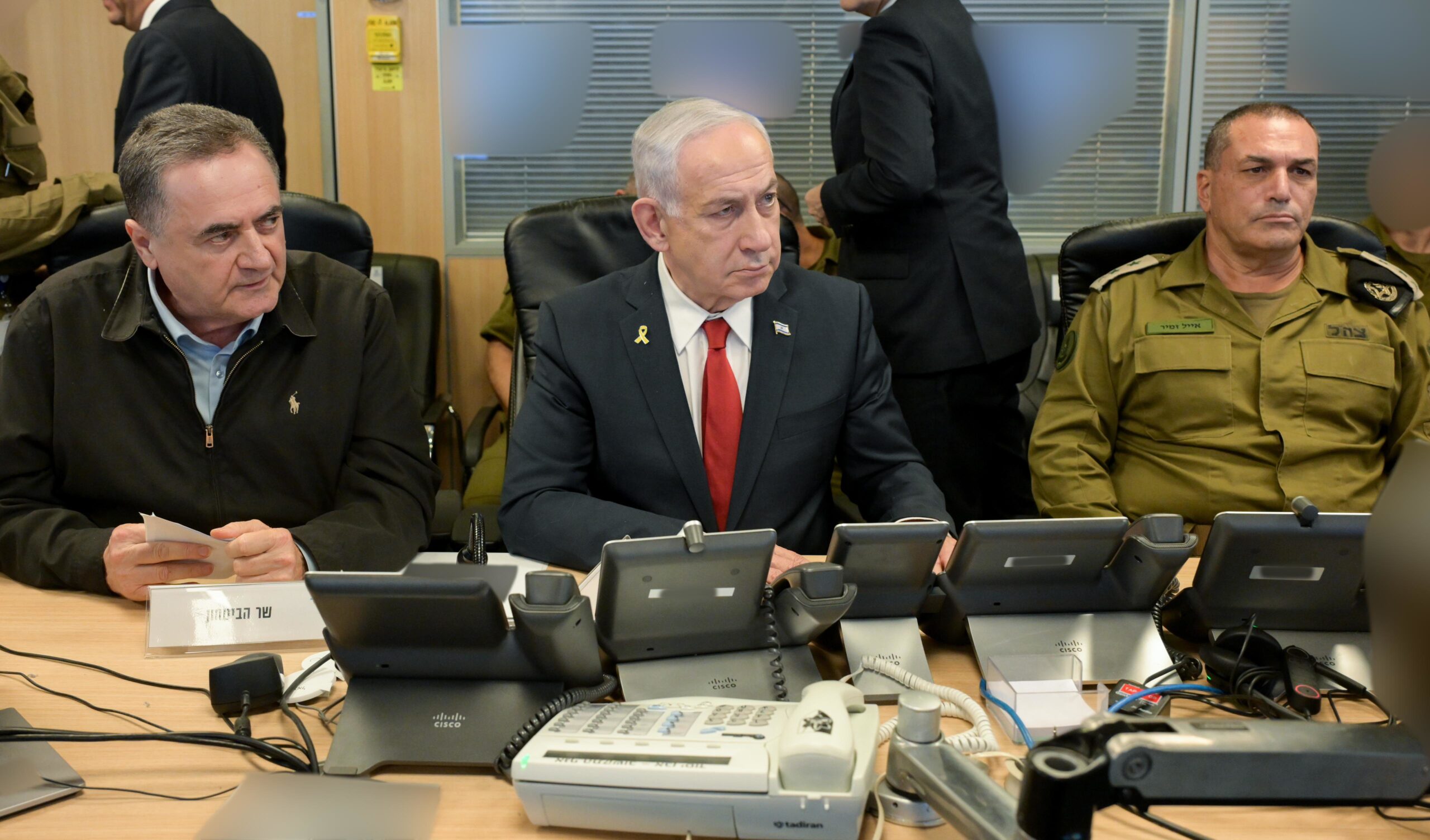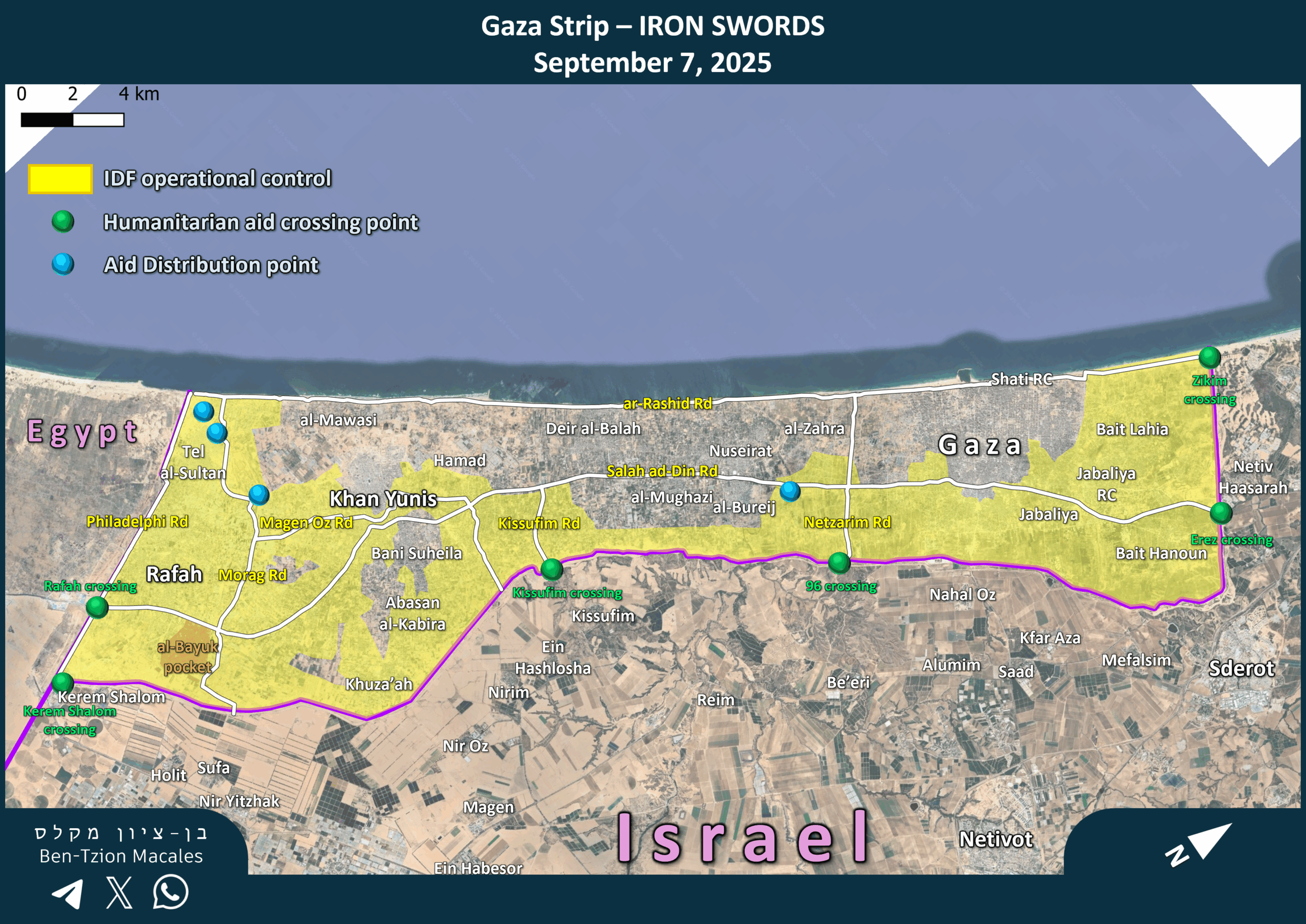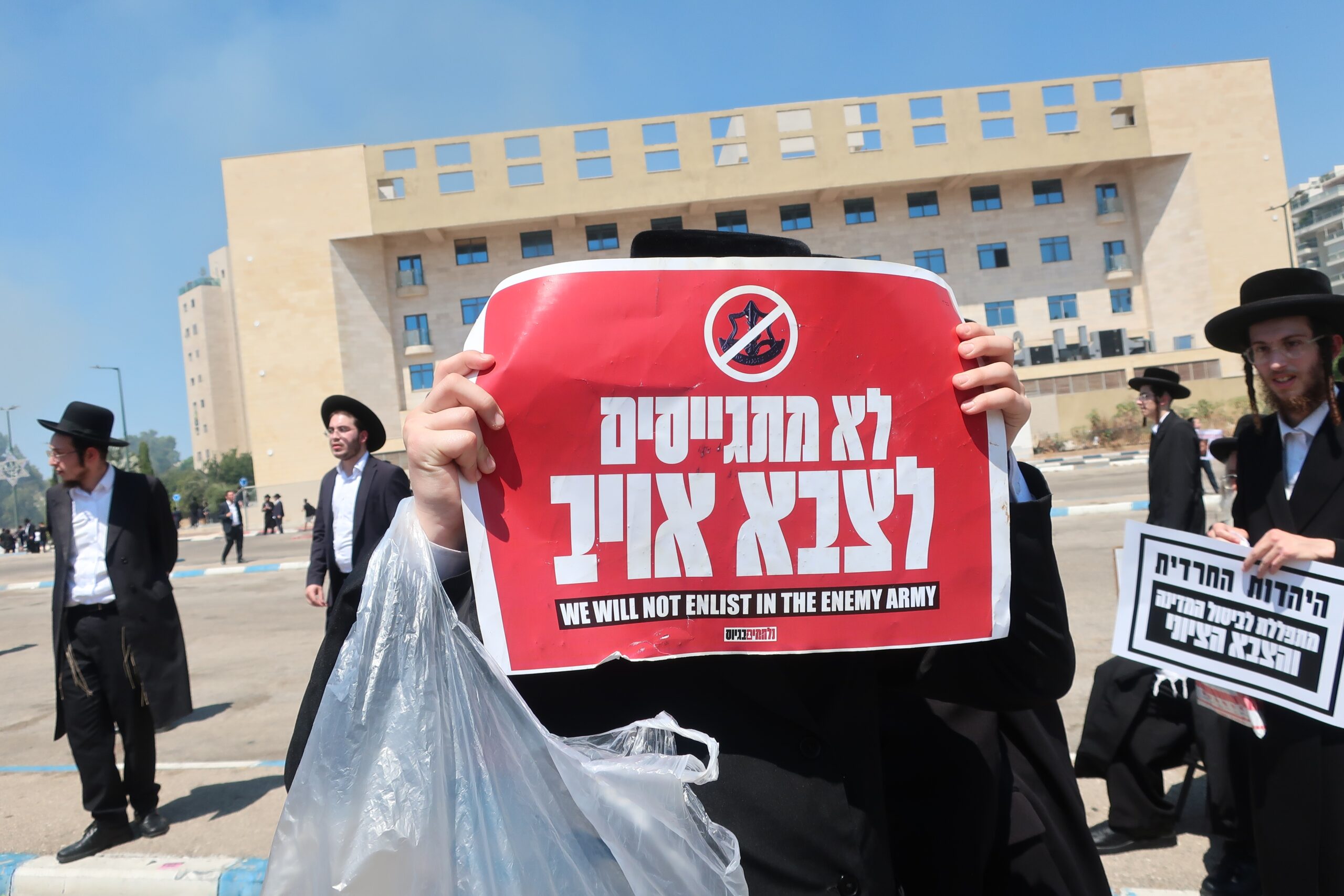Australia/Israel Review
A September of suspense
Sep 18, 2025 | Ilan Evyatar

Gaza battle plans, a draft reckoning and a UN recognition push converge on a restless Israeli home front
Israelis entered the new school year on September 1 in a state of limbo, with all eyes fixed on Gaza. The Netanyahu Government is threatening to launch a full-scale invasion of Gaza City and its environs in the days ahead amid open disagreements with the IDF command over the right course to free the hostages and bring an end to Hamas rule. Meanwhile, at home, the crisis over the Haredi draft festers alongside persistent talk of either a realignment of the governing coalition or even early elections. And abroad, Israel finds itself increasingly isolated as several Western governments prepare to recognise a Palestinian state at the United Nations General Assembly (UNGA) later this month.
On the Gazan front, the Government has pressed forward with plans for a ground takeover of Gaza City and its surrounding districts even as the debate over strategy has spilled out of the cabinet room in leaks to Israeli media.
The IDF, which has increased the amount of territory in the Strip under its control to more than 75% following the completion of Operation Gideon’s Chariots launched in May, argues that those gains created the best conditions yet for a hostage deal and that the army can, if necessary, return to combat after any pause. Prime Minister Binyamin Netanyahu, however, insists that a partial arrangement would squander finite diplomatic credit and force a costly withdrawal from recently seized terrain.
That tension framed a stormy overnight meeting in Tel Aviv on Aug. 31 where IDF Chief-of-Staff Eyal Zamir insisted on raising the phased hostage-ceasefire proposal even though it was not on the meeting’s agenda, setting out its advantages and the IDF’s ability to resume combat should negotiations fail. Several ministers, including Foreign Minister Gideon Sa’ar, signalled support for Zamir’s position, citing an approaching diplomatic “tsunami” and the prospect of further countries recognising Palestinian statehood at the UNGA.
The counter-case came from the right flank of the coalition. National Security Minister Itamar Ben-Gvir and Finance Minister Bezalel Smotrich urged a vote to formally reject the proposal and pressed instead for unrelenting military pressure, arguing that a pause would erode momentum and invite international restrictions. They were joined by voices, including that of the Prime Minister, warning that a 60-day ceasefire would, in practice, set the army back many months as it would have to regain any ground ceded during a truce. Versions of the phased deal at issue – ten living hostages out of 20 still believed to be alive, and the return of 18 bodies in exchange for a 60-day ceasefire, the release of hundreds of Palestinian prisoners and roughly 1,000 Gazan detainees, a partial IDF withdrawal and negotiations toward a permanent end to the war – have circulated for weeks. However, Hamas signalled its acceptance of an Arab proposal along these lines only on Aug. 18 – after Jerusalem had shifted to demanding a permanent, final deal involving the release of all remaining hostages.
Netanyahu refused to bring the matter to a vote and restated his opposition to any partial deal, a stance bolstered – according to participants – by private urgings he has received from Washington to avoid interim arrangements and “finish” the fight.

Israeli PM Netanyahu (centre) with Defence Minister Israel Katz and IDF Chief of Staff Eyal Zamir: Israeli media reports suggest disagreements about the details and risks of the planned Gaza City campaign (Image: GPO/ Flickr)
Zamir warned the ministers that a takeover of Gaza City and the central Gaza refugee camps would mean that Israel assumes de facto responsibility for governance, whatever formal language the Cabinet prefers to use. The exchange turned pointed at times with far-right minister Orit Struck calling the Chief-of-Staff soft-hearted and Zamir replying that if the Government wanted “blind discipline” he was the wrong man for the job.
While no vote took place on Aug. 31, the Cabinet had already approved the plan, labelled “Gideon’s Chariots II”, to take over Gaza City on Aug. 8, and the IDF is continuing its preparations ahead of the launch of this major operation, despite Zamir’s apparent scepticism.
In late August, the army set out in detail what a full takeover of Gaza City would likely entail: a drawn-out campaign under Southern Command stretching well into 2026, involving at its peak some 130,000 reservists alongside five standing divisions. Mobilisation orders have already begun to go out, with the call-ups staged in three waves in September, in November, and again next March, so that forces can be rotated and combat units kept fresh. The design is for 12 brigade task forces, supported by the two Gaza territorial brigades, to advance in phases – first air strikes and evacuations of Gaza civilians to humanitarian zones, then encirclement, and finally a manoeuvre to take control of Gaza City and the camps.
 Facing them, the army estimates, are two Hamas brigades still intact in Gaza City and the central camps, backed by a network of strategic tunnels that still remains to be neutralised.
Facing them, the army estimates, are two Hamas brigades still intact in Gaza City and the central camps, backed by a network of strategic tunnels that still remains to be neutralised.
Yet alongside the military preparations, public sentiment is moving in a different direction, with growing calls to prioritise a hostage deal over an open-ended campaign.
Polls published in the Israeli press consistently show that a majority of Israelis are against a continuation of the fighting and would rather see a hostage deal and an end to the war. Thousands of high-schoolers marked the first day of school – which also marked 696 days of war – with a strike calling for a deal to secure the release of the hostages. Mass protests have been held since the Government decided not to sign off on the terms of the hostage deal that Hamas accepted. On Aug. 26, protestors held a “Day of Disruption”, blocking roads across the country and holding demonstrations outside ministers’ homes.
Meanwhile, as the IDF readies to enter Gaza City, the never-ending draft crisis is threatening to explode as tens of thousands of ultra-Orthodox Israelis prepare for the traditional annual pilgrimage over Rosh Hashanah (Jewish New Year, which begins on the evening of Sept. 22 this year) to Uman in Ukraine, which houses the tomb of Rebbe Nachman of Breslov. Meanwhile, the Attorney-General’s office has issued an opinion that the Government cannot order immigration authorities not to enforce the law against draft dodgers who attempt to leave the country.
Arrests of Haredi draft-dodgers attempting to leave for the Uman pilgrimage could threaten the stability of the governing coalition just as Israel launches Gideon’s Chariots II. Amid the IDF’s manpower shortage and reports that the army has been forced to cut training times for reservists, new Foreign Affairs and Defence Committee chair MK Boaz Bismuth – who replaced Yuli Edelstein in this role after the latter refused to bow down to Haredi demands regarding this bill – has been attempting to advance temporary emergency regulations to stave off a crisis.
Under Bismuth’s proposal, the Government would enact a one-year “state of emergency” order that allows the army to recruit Haredi soldiers according to operational needs without waiting for a full Knesset law. At the same time, enforcement measures imposed by Attorney-General Gali Baharav-Miara, such as the arrest of draft evaders and the freezing of state budgets for yeshivot (Jewish seminary schools), will be suspended. In the background, a constitutional crisis is brewing surrounding the Government’s move to fire the Attorney-General, that was basically disallowed by the Supreme Court in early September. But the Government, and especially Justice Minister Yariv Levin, remain defiant, insisting that the dismissal stands.

Angry ultra-Orthodox men denounce any conscription of yeshiva students (Image: Shutterstock)
According to Bismuth, the framework is designed to provide immediate manpower while avoiding a coalition crisis. Ultra-Orthodox representatives have signalled they may accept higher enlistment numbers in principle under such an arrangement, though no specific targets have been set and the regulations would not include sanctions for non-compliance. Others, however, have criticised the move as a “trial balloon” with little chance of legal or political success, asking what would follow once the one-year period ends.
The gap between commitments and requirements remains significant. In 2024, only 2,940 Haredim were drafted. This is an increase compared to previous years, but still below the Government’s stated target of 4,800 and far short of the army’s operational need, which manpower officials put at more than 10,000.
On the diplomatic front, Israel faces mounting pressure ahead of the annual United Nations General Assembly, where a growing number of countries are preparing to recognise a Palestinian state. French President Emmanuel Macron announced in late July that France would move ahead with recognition, describing it as consistent with his country’s historic commitment to Middle East peace. His statement, however, included no concrete conditions beyond a vague reference to Hamas demilitarisation. Israel has objected that the French move, expected to be formalised in New York, rewards terrorism by granting legitimacy without addressing Hamas’ continued rule in Gaza.
France’s step has been followed by similar announcements from the United Kingdom, Canada and Australia. While several European states, including Slovenia, Ireland, Norway, Belgium and Spain, have already recognised Palestine since the war began, France and Britain stand out because of their weight as permanent members of the Security Council and leading G7 economies. In Israel’s view, such decisions undercut the prospects of a negotiated settlement and diminish Western leverage by giving the Palestinians international standing without requiring any commitment to peace, changes in policy or leadership, or any attempt to address rampant corruption and incitement.
The UK has signalled that recognition will proceed in September, as a UN conference about this topic is scheduled for Sept. 22, unless Israel accepts a ceasefire in Gaza, halts annexation measures in the West Bank and reaffirms support for a two-state solution. British Prime Minister Keir Starmer has said Hamas must release hostages and take no part in Gaza’s future government, but stopped short of setting these as binding preconditions. Israel argues that extending recognition while Hamas remains entrenched would allow the group to claim a political victory, which it will attribute to the October 7 attacks.
Canada and Australia said that their recognition is tied to conditions such as democratic reform, demilitarisation and the exclusion of Hamas from governance, but Australian PM Anthony Albanese later indicated that recognition would go ahead based solely on verbal assurances on these issues given by Palestinian Authority President Mahmoud Abbas.
Jerusalem’s concern is that unilateral recognition shifts the incentive structure: rather than encouraging compromise, it signals that violence and rejectionism yield diplomatic dividends. Officials warn that recognition in the absence of actual Palestinian reforms risks strengthening Hamas’ hand just as Israel intensifies military operations in Gaza.
Diplomatic recognition does not alter facts on the ground, but it does carry symbolic and legal consequences. It could give the Palestinians wider access to international forums such as the International Court of Justice and the International Criminal Court, and feed campaigns for sanctions or boycotts. Israeli officials fear that, at a minimum, it narrows the country’s diplomatic room for manoeuvre at a time when the Government is already confronting protests at home, coalition instability, and the looming Gaza City campaign.
At the same late-night Aug. 31 Cabinet session where ministers clashed over Gaza, the question of annexation also surfaced. Finance Minister Bezalel Smotrich, backed by several colleagues, urged that Israel respond to the expected wave of international recognition of a Palestinian state by applying sovereignty to parts of the West Bank. He argued that any step must be “significant and not merely symbolic,” pressing Netanyahu to make a commitment before the General Assembly convenes later this month.
Officials said the option under discussion would be limited in scope, focusing on specific areas rather than the entire territory. Netanyahu has not taken a final position, though participants noted that the idea is being seriously weighed. American officials have told their Israeli counterparts that the decision ultimately rests with Jerusalem. While Washington has not offered a green light, neither has it drawn a clear red line. “First decide what you want – then talk to us,” one source quoted US envoys as saying, according to the Jerusalem Post.
Recent visits by senior US figures, including House Speaker Mike Johnson and Ambassador Mike Huckabee, have reinforced the impression in Jerusalem that there may be no roadblock out of Washington, though officials acknowledge that any sovereignty move would carry significant diplomatic risks.
In the previous Trump Administration, Netanyahu clashed with the President over plans for annexation of areas of the West Bank shortly before the move was suspended to pave the way for normalisation with the United Arab Emirates and Bahrain in the framework of the Abraham Accords.
The present convergence of war, diplomacy and coalition politics looks likely to make for an uncertain, and turbulent, New Year’s holiday for Israel and Israelis.
Tags: Gaza, Hamas, IDF, Israel, Palestinians, United Nations, United States






